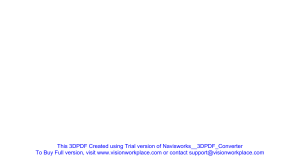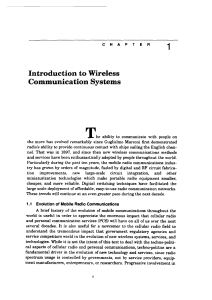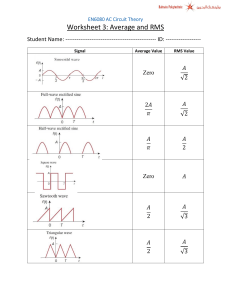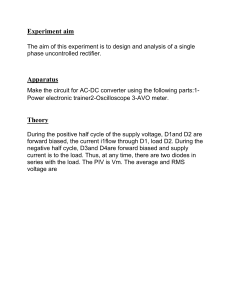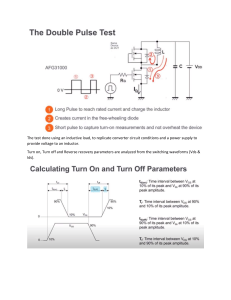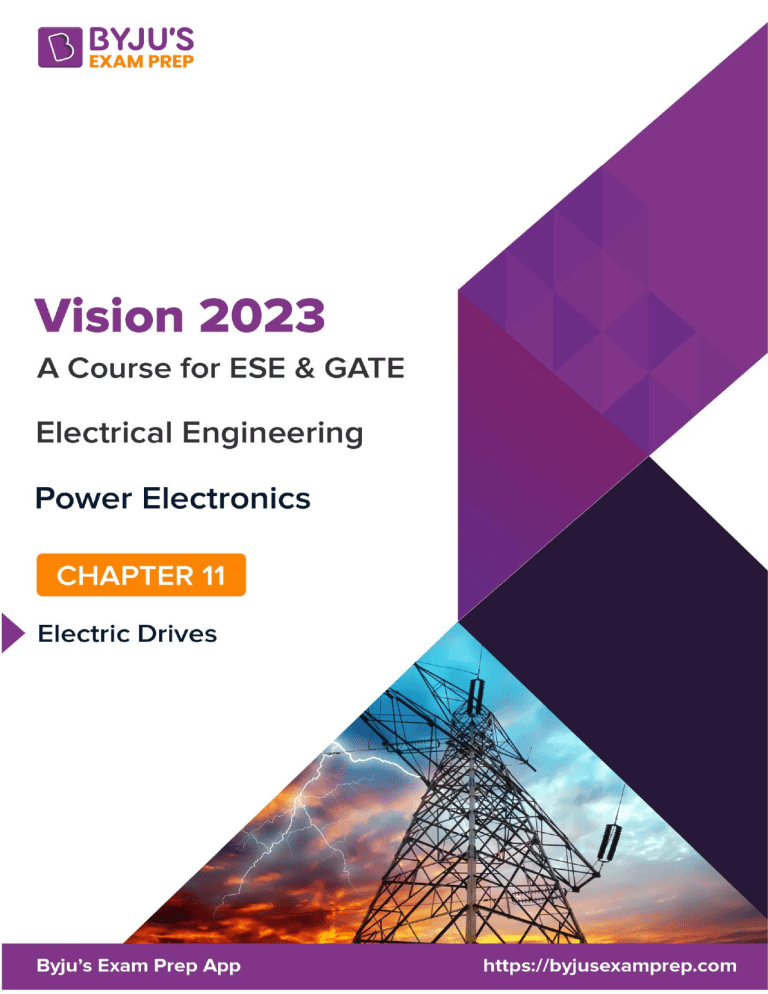
byjusexamprep.com 1 byjusexamprep.com POWER ELECTRONICS 11 1. ELECTRIC DRIVES INTRODUCTION TO ELECTRIC DRIVES In many applications, electric motors supply power to a load, hence, require a variable voltage or variable frequency control. The same can be achieved through power electronic converters. Figure below shows block diagram of an electric drive system. Figure 54: An electric drive system Electric drives are typically of two types: AC Drives & DC Drives. These two mainly differ by the motor type (DC or AC) which supply power. Figure below shows block diagram of a modern electric drive system using power electronic converter. Figure 55: Block diagram of a modern electric drive system using power electronic converter 2 byjusexamprep.com 2. DC DRIVES DC Drives consists of a DC Motor, Power Electronic Converter. i.e. Rectifier (or) chopper. Speed Sensing Mechanism-Tachometer, Feedback circuit and intelligent device (Micro controller). The following dc motors are suitable for speed control applications. 1. Series motor 2. Separately excited dc motor In the speed control application, load remains same i.e., output current is continuous and assumed to be constant. Ea = Z NP P = Z n 60A A ωm = 2πn ω P Z P E a = Z m = . ωm 2π A 2π A Where, Ka = E a = K a ω m Z P 2π A EaIa (Electrical power) = Teωm (Mechanical power) Te = 2.1. E a Ia ωm Te = K a Ia Single phase half wave converter drive: The figure shown below shows single phase half wave converter supplying power to a DC motor. It is assumed that armature draws a constant current, Ia. Figure 56: Single phase half wave converter drive 3 byjusexamprep.com Figure 57: Waveforms for Single phase half wave converter drive Average output voltage, V0 = Vt = Vm (1 + cos 1 ) 2π ;0 1 Rms value of source current, − 1 Is(rms) = Ia 2 Rms value of current through freewheeling diode, 4 byjusexamprep.com + 1 Ifd(rms) = Ia 2 Input power factor, p.f. = 2.2. E a Ia + Ia2 ra Ia (E a + Ia ra ) = Vs Isr Vs Isr Single phase semi-converter drive: The figure shown below shows single phase semiconductor drive supplying power to a DC motor. It is assumed that the armature current is constant. Let ∝1 be the firing angle of T11 and T12 in the armature circuit and let ∝2 be the firing angle of T21 and T22 in the field circuit. Figure 58: Single phase semi-converter drive 5 byjusexamprep.com Figure 59: Waveforms for Single phase semi-converter drive Average output voltage, V0 = Vt = Vm (1 + cos 1 ) π Rms value of source current, − 1 Is(rms) = Ia 6 byjusexamprep.com Rms value of freewheeling diode current, Ifd(rms) = Ia 1 Rms value of thyristor current, − 1 ITh(rms) = Ia 2 Input power factor, 2 p.f. = (1 + cos ) ( − ) 2.3. Single phase full wave converter drive: The figure shown below shows single phase full converter drive supplying power to a DC motor. Figure 60: Single phase full wave converter drive Average output voltage, V0 = Vt = 2Vm cos π Rms value of source current, Is(rms) = Ia Rms value of thyristor current, ITh(rms) = Ia 2 Input power factor, 7 byjusexamprep.com p.f. = 2 2 cos π Figure 61: Waveforms for Single phase full wave converter drive 2.4. Single phase dual converter drive: A single-phase dual converter obtained by connecting two full converters in anti-parallel and supplying power to a DC motor as shown in figure below. Figure 62: Single phase dual converter drive Average output voltage for converter 1, V0 = 2Vm cos 1 π 8 byjusexamprep.com Average output voltage for converter 2, V0 = 2Vm cos 2 π Also, 1 + 2 = The operation of a dual converter feeding a DC motor are as follows: • For converter 1 with ∝1 < 900, motor is in forward motoring mode (Quadrant 1) • For converter 1 with ∝1 < 900, motor is in forward regenerative braking mode (Quadrant 4) • For converter 2 with ∝2 < 900, motor is in reverse motoring mode (Quadrant 3) • For converter 2 with ∝2 > 900, motor is in reverse regenerative braking mode (Quadrant 2) 3. THREE PHASE DRIVES Larger DC motors are fed through three-phase converters for their speed control. For speeds below base speed, three-phase controlled converter feeds power to armature circuit and for speeds above base speed, the same is connected to field circuit. The output ripple frequency of three-phase converter is higher than that of single-phase converter. Hence for reducing armature current ripple, inductance required in threephase dc drive is lower than of single-phase dc drive. Also, the motor performance in three-phase dc drive is superior to that of single-phase dc drive. The three-phase dc drives may be subdivided as, • Three phase half wave converter drive • Three phase semiconductor drive • Three phase full converter drive • Three phase dual converter drive The operation of three phase DC drives is similar to single phase DC drives except that output voltage equation should be used accordingly. 3.1. Three Phase half wave Converter Drive: Average output voltage, V0 = Vt = 3 6 V ph cos 2 Rms value of source current, I sr = ITrms = I a 1 3 9 byjusexamprep.com 3.2. Three Phase full wave Converter Drive: Average output voltage, V0 = 3 6 Vph cos π Rms value of thyristor current, ITh(rms) = Ia 1 3 Rms value of source current, Is(rms) = Ia 2 3 3.3. Three Phase Semi-Converter Drive: Average output voltage, V0 = 3 6 Vph (1 + cos ) 2π Rms value of source current, Is(rms) = Ia 2 3 Rms value of thyristor current, ITh(rms) = Ia 1 3 **** 10
